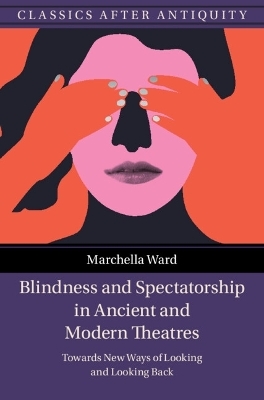
Blindness and Spectatorship in Ancient and Modern Theatres
Towards New Ways of Looking and Looking Back
Seiten
2023
Cambridge University Press (Verlag)
978-1-009-37277-0 (ISBN)
Cambridge University Press (Verlag)
978-1-009-37277-0 (ISBN)
Debunks stereotypes about blindness, in which readers, receivers and spectators from antiquity to the present have been implicated because their persistence relies on audiences to perpetuate them. Argues for a new way of seeing – and of understanding classical reception - using assemblage-thinking and with a focus on the theatre.
The use of disability as a metaphor is ubiquitous in popular culture – nowhere more so than in the myths, stereotypes and tropes around blindness. To be 'blind' has never referred solely to the inability to see. Instead blindness has been used as shorthand for, among other things, a lack of understanding, immorality, closeness to death, special insight or second sight. Although these 'meanings' attached to blindness were established as early as antiquity, readers, receivers and spectators into the present have been implicated in the stereotypes, which persist because audiences can be relied on to perpetuate them. This book argues for a new way of seeing – and of understanding classical reception - by offering assemblage-thinking as an alternative to the presumed passivity of classical influence. And the theatre, which has been (incorrectly) assumed to be principally a visual medium, is the ideal space in which to investigate new ways of seeing.
The use of disability as a metaphor is ubiquitous in popular culture – nowhere more so than in the myths, stereotypes and tropes around blindness. To be 'blind' has never referred solely to the inability to see. Instead blindness has been used as shorthand for, among other things, a lack of understanding, immorality, closeness to death, special insight or second sight. Although these 'meanings' attached to blindness were established as early as antiquity, readers, receivers and spectators into the present have been implicated in the stereotypes, which persist because audiences can be relied on to perpetuate them. This book argues for a new way of seeing – and of understanding classical reception - by offering assemblage-thinking as an alternative to the presumed passivity of classical influence. And the theatre, which has been (incorrectly) assumed to be principally a visual medium, is the ideal space in which to investigate new ways of seeing.
MARCHELLA WARD is Lecturer in Classical Studies at the Open University. Until recently she was the Access Fellow at Worcester College, Oxford. She also co-convenes the Critical Ancient World Studies collective, and writes frequently for non-specialists and also for children.
Introduction: Looking and Looking Back; 1. Towards Visual Activism; 2. Blindness and / as Punishment; 3. Blindness as Metaphorical Death; 4. Blindness as Second Sight; Interlude: Colonial Visions; 5. Blindness and Spectatorship; Conclusion: Assembling the Future.
| Erscheinungsdatum | 05.12.2023 |
|---|---|
| Reihe/Serie | Classics after Antiquity |
| Zusatzinfo | Worked examples or Exercises; 20 Halftones, color |
| Verlagsort | Cambridge |
| Sprache | englisch |
| Themenwelt | Kunst / Musik / Theater ► Theater / Ballett |
| Geschichte ► Allgemeine Geschichte ► Vor- und Frühgeschichte | |
| Geschichte ► Teilgebiete der Geschichte ► Kulturgeschichte | |
| Geisteswissenschaften ► Sprach- / Literaturwissenschaft ► Anglistik / Amerikanistik | |
| Geisteswissenschaften ► Sprach- / Literaturwissenschaft ► Literaturwissenschaft | |
| ISBN-10 | 1-009-37277-7 / 1009372777 |
| ISBN-13 | 978-1-009-37277-0 / 9781009372770 |
| Zustand | Neuware |
| Informationen gemäß Produktsicherheitsverordnung (GPSR) | |
| Haben Sie eine Frage zum Produkt? |
Mehr entdecken
aus dem Bereich
aus dem Bereich
auf den Spuren der frühen Zivilisationen
Buch | Hardcover (2023)
C.H.Beck (Verlag)
20,00 €
Konzepte – Methoden – Theorien
Buch | Softcover (2024)
UTB (Verlag)
39,90 €


